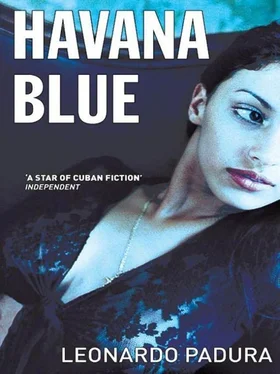“So did I, but not to worry. There are also police who are scared of dogs,” said the Count as he shook the man’s hand.
“That was nice of you,” griped Manolo as they walked to their car. He was wearing his jacket open to the cold air. “You’re very witty today. As if not facing up to dogs were a sin.”
“That must be why they bite you. Look what a sweat you’re in, kid.”
“Yes, it’s all very well to go on about adrenaline, smell and your fucking mother, but the fact is they always go for me.”
They got into the car; Manolo took a deep breath and put both hands on the wheel.
“Well, we now have some idea about who Zoilita is. The plot thickens.”
“The plot thickens, but it makes no odds. Look, let’s divide up now. I’ll go to collect the guest list for the deputy minister’s party and you put two people on task to find out about Zaida and Zoilita. Particularly Zoilita. I want to know where she’s got to and what she’s got to do with all this.”
“Why don’t we switch tasks? I’ll collect the list, go on.”
“Hey, Manolo, you can play with the chain but leave the monkey in peace. No more griping,” he said and looked into the street. He was fascinated by the steady flow of white lines the car was devouring, and only then did he notice it had stopped raining. But the pain from his hungry misused stomach now met the pressure from the urine filling his bladder. “What else are you thinking of doing?”
Manolo kept staring at the road ahead.
“I’m talking to you, Manolo,” insisted the Count.
“Well, I reckon there are too many bloody coincidences, and Zoilita’s much too much of a coincidence, don’t you think? And I reckon you should talk to Maciques. That man knows more than he’s letting on.”
“We’ll see him at the enterprise on Monday.”
“I’d see him before then.”
“Tomorrow if there’s time, OK?”
“Hey, let’s have some music, I’m going to piss myself.”
“You can piss yourself, but I can’t put any music on.”
“What’s a matter, man, you still shaking because of that mongrel?”
“No, it’s your fault we can’t listen to music. They stole our aerial from in front of Zoilita’s place.”
His favourite song had always been “Strawberry Fields”. He’d discovered it one unexpected day in 1967 or 1968 in his cousin Juan Antonio’s house; it was horribly hot, but Juan Antonio and three of his friends were older, in eighth grade, and they’d squeezed into his cousin’s bedroom, he recalled, as if they were going to pray to the prophet: they were sitting on the floor around an ancient RCA Victor gramophone, it even had termites, and an opaque, unidentified record was turning on the deck. “It’s a copy, idiot, of course it’s not got a label,” said Juan Antonio as bad-temperedly as ever, and he also sat on the floor because nobody wanted to speak, not even the women. Then Tomy moved the arm and placed it lovingly on the record, and the song began; he understood nothing, the Beatles didn’t sing as well as they did on real records, but the big lads hummed the words, as if they knew them, and all he knew was that “field” was park, “centerfield” was centre of the park, he concluded, but that would come later. He felt as if he were experiencing a unique act of magic, and when the song finished he asked, go on, play it again, Tomy. And he started singing again and didn’t know why: he didn’t want to accept that that melody was flagging up his nostalgia for a past when everything was perfect and straightforward, and although he now knew what the lyrics meant, he preferred to repeat them unthinkingly and just feel as if he were walking through that field of strawberries he’d never seen, the one his memories were so familiar with, to be alone with that music. “Strawberry Fields” always came like that, out of nowhere, and pushed everything else out. He sang along, picked up on any phrase and felt better; he no longer saw the dark or gloomily overcast sky or the image of Rafael Morín speechifying on the podium at school. He didn’t want to smoke and listen to Manolo recounting his latest amorous conquest, as he drove him to Tamara’s house, “Strawberry fields forever, tum, tum, tum…”
“The book was right there.”
Time is an illusion; nothing had changed in the library: the complete set of the Espasa-Calpe Encyclopaedia , the one most packed with knowledge, its dark blue spines and gilt letters still shiny despite the years that had gone by; Tamara’s father’s Doctor in Law certificate still fearlessly enjoying its privileged position, even above Victor Manuel’s two pen-and-ink drawings he’d always coveted so much. The dark tome of Father Brown stories, with the leather covers that his fingers caressed, brought on another bout of melancholy; old Doctor Valdemira recommended them to him so many years ago when the Count could never have imagined he’d become a colleague of Chesterton’s little priest. And the mahogany desk was immortal, broad as a desert and beautiful like a woman. A handsome writing desk. Only the leather on the swivel chair seemed rather tired, it was over thirty years old and genuine bison; that was the place occupied by the person responsible for night-time revision before an exam, the privilege of the one who knew most. The day Mario Conde first entered that room, he had felt small, helpless and terribly uncultured, and his memory could still recreate that painful sensation of intellectual inadequacy he’d yet to cure himself of.
“I’ve often dreamed of this place. But in my dreams I never remembered your father having a telephone here, or did he?”
“No, never. Daddy hated two things to the point of sickness: one was the telephone and the other television, and that shows how very sensitive he was,” she recalled as she flopped down into one of the armchairs in front of the desk.
“And do those two phobias relate to this redbrick fireplace in a Havana library?” he asked as he bent down over the small hearth and played with one of the tongs.
“It had logs and everything. It’s pretty, isn’t it?”
“Sorry to sound rude… Given it never snows in Cuba, pray what is the point?”
She smiled sadly.
“It was the cover to a safe. I found that out when I was twenty. Daddy was a real character. An eccentric.”
He put the tongs down and sat in the other armchair next to Tamara. The library’s only source of light was from a small Art Nouveau lamp on a bronze stand embellished by small bunches of deep purple grapes, and she was bathed in an amber light that endowed her face with a warm humanity. She wore a tracksuit as deep blue as the Espasa-Calpe , and her clumsy ballerina body seemed to relish that garment which sheathed and shaped her.
“Rafael had the extension installed some seven or eight years ago. He couldn’t live without the telephone.”
He digested Rafael’s decision and felt his shoulders sag, exhausted by an overlong day when he’d only heard talk of Rafael Morín. So many people had talked to him that he’d now begun to wonder whether he’d really known him or whether he was a circus freak with a thousand faces, all linked by a family air, but quite distinctive. He’d have preferred to speak about other things, would have felt good telling her he’d sung “Strawberry Fields” all the way to her house. He was in the mood to make that kind of confidence or to tell her he thought she’d only got better and better, tastier and tastier, but finally decided she might think such confessions a touch cheap and vulgar.
“I never heard about your father’s death. I’d have gone to the funeral,” he said finally, because the old diplomat’s presence was tangible in that room.
Читать дальше











